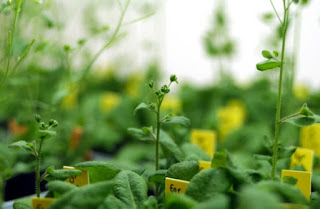Mutations Not Entirely Random
Tenets fundamental to neo-Darwinian doctrine include the ideas of natural selection, mutations, and randomness. Although evolution is supposed to be purposeless, many evolutionists reify Natural Selection into a being that makes uses mutations to craft its wares.
It has long been thought that mutations are entirely random. That seems reasonable enough, but it was discovered that they are not so random after all. Indeed, scientists are learning that adaptive changes are purposeful. A genome study on the genus Arabidopsis (rock cress, obrieta) was conducted about random mutations.
 |
| Arabidopsis, CSIRO / Carl Davies (CC BY 3.0) |
Since rock cress has a fairly simple genome, scientists took a notion to sequence it and check for mutations. (The science of genetics was pioneered by Gregor Mendel, peas be upon him.) The Master Engineer has surprises hidden that come out when our science and technology advance. DNA has protections for key areas, and epigenetic switches determine gene expression. While there is genetic degradation and some degree of randomness, secularists were a mite startled at what they found. Of course, they did not see fit to glorify the Creator.
A fundamental axiom of evolutionary theory is the alleged random appearance of mutations in the DNA of an organism. This supposedly creates novel genetic variation for the mystical agent called natural selection to act upon. That essential premise has now been utterly debunked in a new secular research paper published in the journal Nature.
. . . a comprehensive study of an entire genome to evaluate mutation and variation had not been done—until now. In this new study, the researchers used a small weedy plant called Arabidopsis which has a very small and compact genome that makes it much easier to study. For this study, the scientists analyzed the DNA sequence from a variety of specialized strains of Arabidopsis that had accumulated large amounts of DNA variation (mutations) over many generations.
To read the full article, plant yourself on "Random Mutations Debunked by Secular Scientists." I wonder if people might respect dandelions more if they produced other colors.